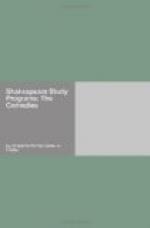Is there a moral against the current educational methods and the affectations social and literary of Shakespeare’s time? The monastic and aristocratic elements in education considered as opposed to the progress of Women and the People. Show the general conditions of education prevailing after the Middle Ages, and the new spirit of the Renascence making itself felt, also the degree in which this appears in this plot. If Shakespeare’s spirit, as manifested in this Play, had been more influential practically, do you think a different road would have been taken? (For hints upon this line of thought see Introduction in the “First Folio Edition"). How far is Berowne to be taken as the spokesman of Shakespeare? Note what Pater says of him as “a reflex of Shakespeare himself,” and trace the truth of this as concerns the fact that he is never “quite in touch” with the level of the understanding shown by others of the Play, and state the bearing this has upon the Moral of the Play. (See Pater’s “Appreciations” or extract from same in “Selected Criticism,” pp. 242-248, “First Folio Edition").
Why does so frolicsome a Comedy end so seriously? Does that make it funnier?
QUERIES FOR DISCUSSION
Is there really a moral in the Play in favor of nature and sincerity or is it merely read into it?
Is Dowden right, who says “there is a serious intention in the play,” or Barrett Wendell who says: “like modern comic opera, such essentially lyric work as this has no profound meaning; its object is just to delight, to amuse; whoever searches for significance in such literature misunderstands it.”
In comparison with other comedies of Shakespeare, is a serious undercurrent discernible in all of them, but none in this?
IX
SHAKESPEARE’S PLAY AND TENNYSON’S POEM ("THE PRINCESS”) UPON EDUCATION OF MEN AND WOMEN
Summarize story and outcome of Play and Poem in comparison and in contrast. Does Shakespeare’s exposition of the contemporary view of education account for the condition Tennyson criticises? If so, are women to blame for it? If not, how much does this modify Tennyson’s criticism of the educational exclusion that is the scheme of the College in “The Princess?” Shakespeare seems to point his moral against his male characters for their exclusiveness, Tennyson against his women characters? Which one goes the deeper? Wherein do they agree and disagree? How may they be made to supplement each other? Has Tennyson’s poem presented any phase of the question touching upon popular interest in exclusive educational schemes? Is Shakespeare, considering his time, the more democratic in his views of life, as shown by this Play, in comparison with those brought out in Tennyson’s Poem. Why does Shakespeare leave the women in moral and actual command of the situation?




